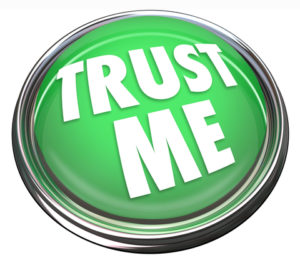We are indebted to the Association of International Certified Professional Accountan ts for prompting this line of enquiry. It seems we implicitly recognise “shady” characters and assume them to be conniving and unscrupulous. But we apparently find it very difficult to spot trustworthiness. Here are a few helpful tips.
ts for prompting this line of enquiry. It seems we implicitly recognise “shady” characters and assume them to be conniving and unscrupulous. But we apparently find it very difficult to spot trustworthiness. Here are a few helpful tips.
Trustworthy people are:-
- Consistent in their behaviour – they fulfil their promises;
- Compassionate and humble – they show empathy;
- Respectful of boundaries – they don’t impose themselves and avoid bullying;
- Compromising – they make small sacrifices and thoughtful gestures;
- Relaxed – they don’t have to fake their behaviour;
- Conscious of other’s time – they are never late and don’t cancel plans at the last minute;
- Grateful – they give credit to others in the team;
- Truthful – they are totally transparent with the facts – no lies or fudges;
- Confiding – they discuss their own vulnerabilities;
- Not materialistic – they don’t crave physical assets;
- Correct in an inordinate number of occasions;
- Not gossipers – they avoid rumours and stick to the facts;
- Willing learners – they acknowledge that they do not have all the answers;
- Connected to a variety of social groups;
- Great listeners – they are there for you!
Trustworthiness implies honesty and truthfulness. Regrettably, these traits are not fashionable in the modern world. We have a habit of convincing ourselves that our dishonesty is acceptable – “Yes my child, Santa Claus is real.” The fibs that we tell our kids merge seamlessly into adult life. “The cheque is in the post.” But trustworthiness is more deep-rooted than simple honesty.
Studies of ethical dilemmas point to those acting for the common good as being trusted by others. In evolutionary terms, people who tend to act in mutually beneficial ways are most likely to be chosen as partners in group activities – thereby improving their chances for reproduction!! Ethical responsibility pays off it seems.
But this can produce some really odd complications because mutually beneficial decisions are not always best. “Let’s all award each other a pay rise and see the company collapse under the costs.” “Let’s take the rest of the day off – we’ll meet the production targets tomorrow.” True leaders who show insight and initiative outside of mutually beneficial decision making are trusted – so long as they produce results that are mutually satisfying. Sticking to principles is also recognised as an important trait of trustworthiness but not always. Successful managers display doggedness in their quest for a better performance but are only trusted when they show empathy. Hubris is never trusted.
So identifying and describing trustworthiness can be difficult! If you want people to trust you, you might want to stick to your principles – and be careful that others must benefit eventually.
But at the end of the day no matter which way you frame it – the only way for you to be trustworthy is for others to trust you! Doh! If you are not trusted you cannot be trustworthy. It’s a salutary thought for the conniving and the unscrupulous.

